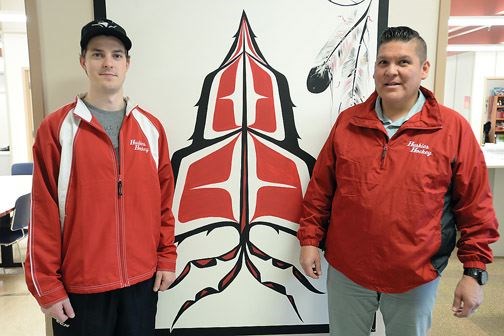School District 57 has two new sports coordinators in charge of bringing in new programs at no cost to students.
They were hired by the aboriginal education department, said manager Shelly Niemi.
"Research shows that if you can engage students in healthy activities and healthy opportunities early on in their academic career, the chances are that they're going to succeed throughout the education system and graduate," said Niemi.
That's one of the ultimate focuses of the department's efforts, given the district's aboriginal graduation rate of 48 per cent compared to 81 per cent of non-aboriginal students last year.
But most of the programming will appear in schools, open to all ages and all students.
"It's going to be an inclusive program with an aboriginal focus," said Niemi of the Northern Huskies Sports Program, which was named with the help of elders.
They key is having no fee to ensure access for everybody.
"I think what really excites me about it is that it's new, that it is introducing students to a sport that they may have never been able to participate in before because funding or transportation was a barrier."
The coordinators hope to work with BC Association of Friendship Centres to bring in camps to introduce new sport to students.
This year, they already have a lacrosse camp in the works open to all students.
Both Lance Potskin and Kalen Spoletini previously worked as aboriginal educators in separate schools but will now focus on district-wide duties.
"This is for everyone," said Spoletini, who also coaches hockey outside of school.
His hope is that the format of the classes they run, both in and out of school hours, will mean kids have the chance to make new friends in other social circles.
"I feel like this breaks those barriers," said Spoletini. "(It's) also a deterrent from other activities, because some of the neighbourhoods, some of the schools have people recruiting for different things," said Potskin, often for drugs or gangs. "Kids get bored, man, and when they get bored, there are other things grabbing at them."
Spoletini recalled driving around Ron Brent elementary after school with another worker to make sure gangs weren't talking to the kids still hanging around the playgrounds.
"They target whoever, they don't care. One kid walking home, or hanging around the schools alone," said Spoletini.
That's where they hope to come.
"If they're not in that place, they're not going to get picked up," he said.
"So, getting to do this here, on a much larger scale, it's just that much more meaningful," Spoletini said.
The two are coming off a successful two-week summer hockey camp that saw about 40 kids participate and they also attended a Hockey Canada training camp themselves, to give educators ideas about how to integrate sport into classrooms.
Building on that, the department will offer hockey practices twice a week after school to Grade 6 to 9 aboriginal students at the Kin Centre.
Last year Spoletini organized an Indigenous Games for his school against Harwin elementary, inspired by the North American Indigenous Games.
"It's like the Olympics, but they implement so much culture," he explained of the day which featured archery, basketball, badminton and more.
This year, he hopes to plan it as a district-wide event in June. That concept is also one of the key ideas behind the initiative, Niemi said.
"When you do that with no cost, then you've removed that barrier that I can't participate," she said. "You get to actually be able to bring a collective group of children together to experience that sport and create new friends, new relationships, new opportunities and really focus it around connectedness to school."



